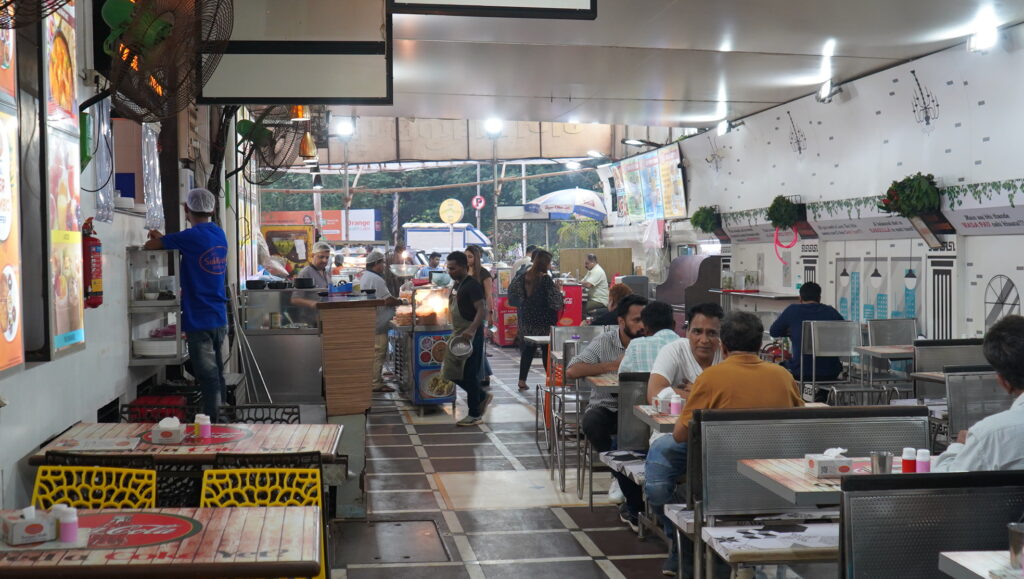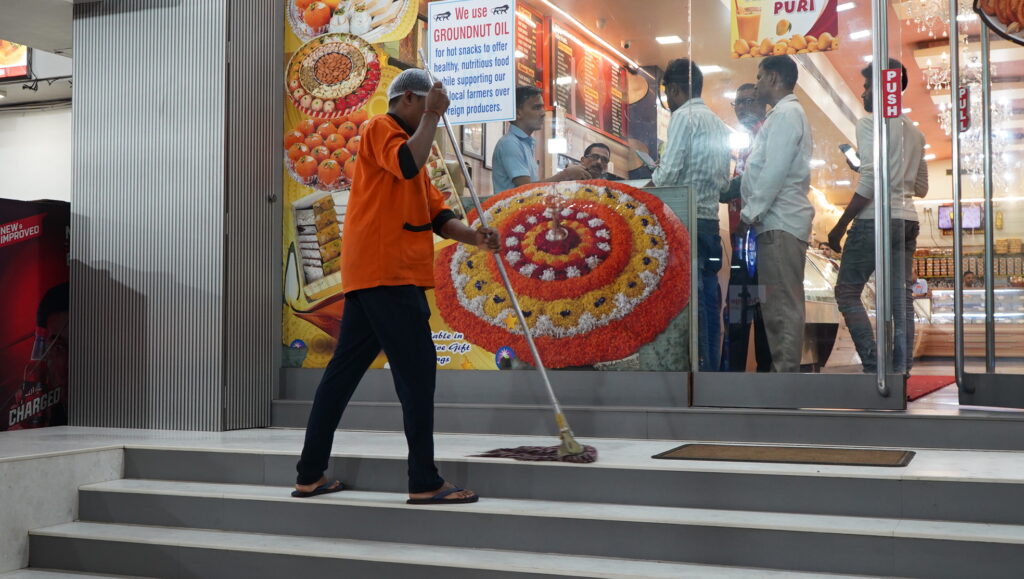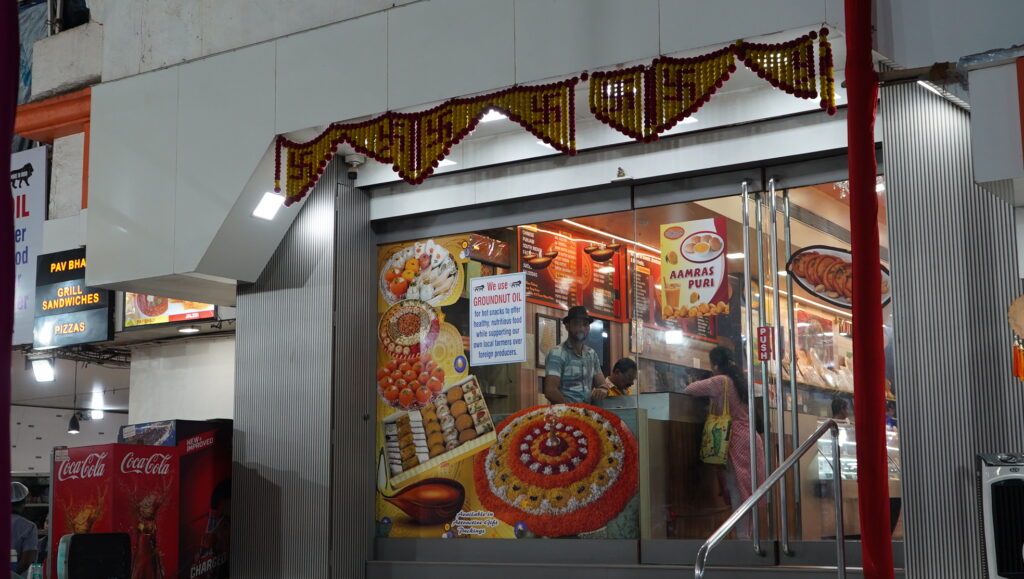

Jain Subkuchh Food Plaza — a popular family-run chain of vegetarian eateries in Mumbai’s Goregaon, Malad, and Kandivali — has successfully upheld high hygiene standards even during peak crowd hours and pandemic disruptions. Known for its clean environment, efficient parcel service and sit-down dining, the food plaza has become a model for hygiene- conscious food businesses in the city. In this exclusive report, Clean India Journal’s Nandakumar Marar visits the Goregaon outlet to explore the hygiene practices and people- first management that kept the brand thriving through challenging times.
Stepping into business after completing the Global Family Managed Business program (SP Jain) in 2007, its owner Dushyant Jain informs that the family has been in the food business since the 1960s. “With outlets in the name of Jain Sweets, food is our core line,” he said. Jain Subkuchh Food Plaza, which has multiple outlets in Mumbai, focuses on food management, waste management, pest management and customer feedback.
Jain oversees operations at two restaurants (Subkuchh Multi-Cuisine and Subkuchh Ki Thali), one sweets/snacks shop (Subkuchh Sweets, Namkeen and Dry Fruits Showroom) and a banquet hall, all housed in one structure. “Starting with a sweet shop, I made major changes at the food plaza never losing focus that hygiene is important to us. In fact, it has been so from the day we started,” he added.
From the experience gained from running many outlets, Jain focused on “result-oriented processes” over “pricing”. When it comes to cleaning, the outlets preferred “cleaning solutions from Diversey”. Subkuchh owners have always followed the principle that what is good for the customer is good for their own family too. “Though hygiene in the food business came
into focus only during the Covid pandemic, it’s always been important to us since we started operations in 2006-07. When my family eats at the restaurant they should feel as if they are dining at home.”
Nowadays, hotels offer all kinds of food – Punjabi, Chinese, chaat, Jain and south Indian – as customers seek variety. At such times it becomes difficult to maintain separate areas. Subkucch ensures that this happens. “In fact, cutting or chopping vegetables too is done in separate areas and ingredients are not allowed to get mixed.”
The outlet emphasizes on good packaging to avoid spillage. “There is no scope of food oozing out of the packets either due to breakage or contents flowing into each other as heavy packaging is done. Food in this kind of packaging can be transported safely over long distances and customers can even reuse them.”
Maintaining cleanliness is always a challenge for all restaurants, especially during monsoon and on days with high footfalls. Subkucch handles it very professionally with a specific team which is assigned to the task.
“More members are added when the customer number rises during specific hours at weekends. While we cannot stop customers entering our outlets with wet footwear, we ensure that high-pressure machines are used in our cleaning operations
apart from manual cleaning. Friday is dedicated to deep cleaning every week. We do this by shutting shop for four to six hours in the late evening hours. From the floor to ceiling, every inch of the place is cleaned and this is beyond what is done daily,” he said.
That leads to the inevitable question that are the staff trained to handle cleaning, especially when done with machines? Jain replied in the affirmative. “Every four to six months, the staff is put through a half-day workshop under the supervision of an outside expert. This workshop is not necessarily an officially certified one but is basically a chance to update know-how.”
According to Jain, this regular training is necessary due to the high level of attrition in the food industry. “There is no guarantee that staff who have undergone such training will be working with us six months later,” he said, adding, “For
drain cleaning, which is done every 10 days, we engage an external agency.”

Apart from the cleaning staff, even the managers go through refresher courses “every six months. We depend on the FSSAI
course”. A unique situation arose during the pandemic, according to Jain. “While we did not close operations, only parcel orders were catered to. The staff was trained for three days to understand Covid conditions, maintaining the mandatory distance and other standard regulations.”
Covid put every industry through the wringer, especially those connected with food. It was a life-changing time for everyone.
Employees made a beeline to return home as there were no early signs of normalcy being restored in businesses. Subkuchh too had many from outside Mumbai who were wanting to return.
“We convinced many to stay back and not spread the virus while travelling. Accommodation for them was arranged on the upper floors of the restaurant. They were assured of food and basic facilities even if our business would not function.”
Jain also had to ensure that the employees remained Covid-free. “We arranged with nearby doctors to check upon them every
two weeks and advise us about medicines and steam inhalers.”
It was difficult to keep the employees motivated during the Covid period. After 10-12 hours of hard work every day, which is the norm in the hotel industry, there was not enough work which resulted in morale going down. “Fortunately, the parcel deliveries, even though restricted, kept them engaged,” said Jain.
Avoiding food waste is quite a challenge for those in the food industry. Subkucch sticks to a formula that “gives us an idea of
how much needs to be prepared”. “The wastage is generally less, as our calculations are quite accurate.”
But there are occasions when there is excess food. “This happens when guests don’t turn up at the banquets as per numbers given to us. Instead of throwing it out we ensure it is distributed among the needy through the Robinhood Army whose volunteers pick up excess food,” said Jain, adding that no excess food is reprocessed. “I would rather lose money than play
around with quality.”
Subkuchh also runs its own outreach programme. “On some Sundays we prepare dal khichdi and some sweet for distribution by the Robinhood Army. On a couple of occasions, we too went out for the distribution.”

Apart from food wastage, there is also kitchen waste that the hotel industry is forced to handle. Subkuchh has experimented with composters. “One of my cousins had a composter from a company called ECOBOT for processing organic waste into compost over a fixed number of hours. The other is a crusher machine in which everything is converted into liquid which can then be released into the drain. Composting is our preferred option, and the quantity generated, which is huge, is given out.”
When you compost yourself there is a new problem to tackle, something that few in the food industry want to undertake. “The
stink is quite unbearable. After using a composter during Covid, we stopped doing it ourselves and now hand it out to an outside agency.”
Customers are very particular about the cleanliness in washrooms. Many, in fact, feel repulsive in entering restaurants which do not have clean toilets. Subkuchh takes special care to maintain hygiene and cleanliness in washrooms.
“We clean them thrice every day. In addition, washrooms on all floors have a ‘safe seat’. It is a system wherein the plastic covering the seating area is replaced after every use.
“There is a machine to do this, after every person leaves the washroom post-use, a sheet cover is placed on the commode and disappears once a button is pressed by the next user. This product supplied by Agrasen has been in use in all washrooms, except the gent’s washroom, for more than nine years,” said Jain.
The staff is quite aligned with the motives of the management when it comes to cleanliness and hygiene. “We have tried to instill into their minds that cleaning for hygiene is not just work, it has value in the food business. If the staff believes in
what the management is doing and its purpose, getting things done is easier as it ensures that the systems are followed.”
Then there is the problem of tackling pests – cockroaches and flies. Customers do not hesitate to use the social media in bad-
mouthing outlets when a problem occurs. Subkuchh takes particular care in warding off these pests. “We have handed pest control to an outside agency which does it every 15 days. Every seven days, there are jell drops to keep cockroaches away. As we deal with food, the pest control is done with only herbal material. The agency also conducts an audit every two months.”
How does Subkucch view pest control – cost or investment? “Earlier it was cost, and we’d get it done every three months only. But now it is viewed as an important business investment. We deal with agencies who are result-oriented rather than price-oriented.”
According to Jain, customers now find it easier to respond online “especially after delivery of parcels”. “Technology like QR
Codes is also very useful. There is a daily check on customer feedback and reviews, positive or negative, and we try to give an honest reply. From our side, we feel the effort to do everything right is done but the reality can be judged from customer
feedback, especially on our Google page, Zomato or Swiggy where most reviews are posted.
“Every three months, there is an agency appointed to point out a consistent issue, whatever it can be, and alert us. They tell us if the issue raised is related to a product, a service or about cleanliness, or anything else, the necessary changes are made,” he concluded.
 CIJConnect Bot-enabled WhatsApp
CIJConnect Bot-enabled WhatsApp












